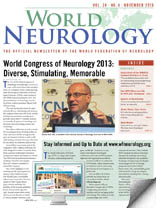
2012 APAYNET workshop participants in Melbourne, Australia.
Young neurologists, future advocates of the brain are ready to embrace the 2013 WCN congress theme, globalization of neurology.
We agree with Vladimir Hachinski that neurologists are the true guardians of the brain.
The International Working Group of Young Neurologists (IWGYNT) held its inaugural meeting at the 2009 World Congress of Neurology in Bangkok and is ready to embrace the concept of globalization.
We represent the common interests of young neurologists and neurologists in training worldwide within the World Federation of Neurology.
IWGYNT continues to establish and foster networking between young neurologists and trainees across the globe.
We wholeheartedly support international exchange programs across the globe.
In 2009, panels of delegates were organized to represent each continent (two delegates per continent). These delegates continued their hard work to achieve the mission representation, networking and exchange programs for young neurologists and trainees.
Asia Pacific Association of Young Neurologists and Trainees (www.apaynet.org) was born as a result of IWGYNTs advocating for international young neurology. APAYNET continues to be the only organization in Asia to specifically represent the interests and young neurologists and trainees in Asia Pacific region. We were following the footsteps of European Association of Young Neurologists and Trainees (EAYNT) who were quite successful in this mission in Europe in the recent years.
Young neurologists need good clinical training. Not all centers in Asia Pacific region have the necessary facilities to train young neurologists in their area of interest, so the trainee may have to spend time in another country. Our group will try their best to facilitate this process to make improve post-graduate training across the region.
Activities
Since 2011, APAYNET representatives delivered lectures and workshops on matters for junior neurologists and trainees at local and regional meetings. In 2012, there were two major activities.
APAYNET was invited to represent World Federation of Neurorehabilitation (WFNR) young neurologists interest group at the 2012 WFNR congress in Melbourne. Tissa Wijeratne chaired the workshop, which focused on post stroke spasticity. It was a huge success: 15 trainees participated; delegates from several Asia Pacific countries were present. The participants enjoyed the workshop. The inaugural APAYNET workshop, chaired by Wijeratne, conducted in conjunction with the 13th Asian Oceania Congress of Neurology in Melbourne in 2012.
The workshop opened by an online presentation on neurology training and teaching in Europe, journey of European neurologists and trainees by Walter Struhal, Bruce Campbell from Australia and New Zealand, Surat Tamprawate from Thailand, Hans Tu from Royal Melbourne Hospital and Western Hospital, Jong Seok Bae from Korea and Hemal Horadagoda from Sri Lanka.
Arthur Wesley Thevathasan, a young upcoming star in the movement disorders field in Melbourne from Australia, Professor Man Mohan Mehindiratta from India were among the speakers.
One main issue of this workshop is how to create more training and learning opportunities for the young neurologists and trainees in the region.
Stroke is the leading cause of adult disability in Sri Lanka, which has a population of 23 million. Sri Lanka health care workforce is trying their best to improve stroke care in the country to keep up with the rest of the world in the recent years. There is a strong need for ongoing stroke care training and education in Sri Lanka to enhance this process further.
2013, APAYNET conducted a series of stroke master classes in Sri Lanka.
The World Stroke Organization endorsed Stroke Master Class series in Sri Lanka. Wijeratne, Darshana Sirisena (Young Neurologist from Sri Lanka) and Nirodha De Silva (young physician with an interest in stroke from Sri Lanka) were the key organizers. All aspects of stroke care and management were covered during the stroke master class series. Despite a lot of challenges, more than 500 Sri Lankan doctors, nurses and allied health staff took part in this highly successful stroke master class series.
